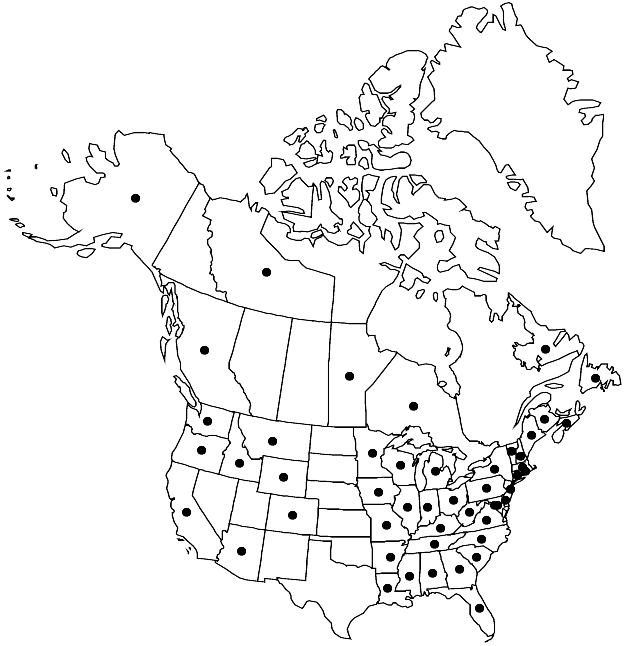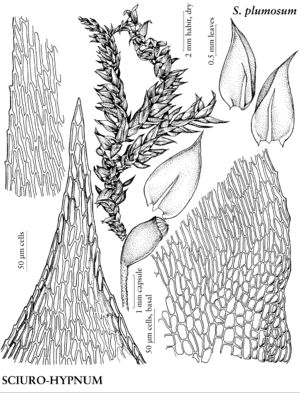Difference between revisions of "Sciuro-hypnum plumosum"
Arctoa 11: 270. 2003.
FNA>Volume Importer |
imported>Volume Importer |
||
| (6 intermediate revisions by 2 users not shown) | |||
| Line 9: | Line 9: | ||
|special_status={{Treatment/ID/Special_status | |special_status={{Treatment/ID/Special_status | ||
|code=F | |code=F | ||
| − | |label= | + | |label=Illustrated |
}} | }} | ||
| − | |basionyms={{Treatment/ID/ | + | |basionyms={{Treatment/ID/Basionym |
|name=Hypnum plumosum | |name=Hypnum plumosum | ||
|authority=Hedwig | |authority=Hedwig | ||
| + | |rank=species | ||
| + | |publication_title=Sp. Musc. Frond., | ||
| + | |publication_place=257. 1801 | ||
}} | }} | ||
|synonyms={{Treatment/ID/Synonym | |synonyms={{Treatment/ID/Synonym | ||
|name=Brachythecium plumosum | |name=Brachythecium plumosum | ||
|authority=(Hedwig) Schimper | |authority=(Hedwig) Schimper | ||
| − | }}{{Treatment/ID/Synonym | + | |rank=species |
| + | }} {{Treatment/ID/Synonym | ||
|name=Eurhynchium semiasperum | |name=Eurhynchium semiasperum | ||
|authority=Müller Hal. & Kindberg | |authority=Müller Hal. & Kindberg | ||
| + | |rank=species | ||
}} | }} | ||
|hierarchy=Brachytheciaceae;Sciuro-hypnum;Sciuro-hypnum plumosum | |hierarchy=Brachytheciaceae;Sciuro-hypnum;Sciuro-hypnum plumosum | ||
| Line 35: | Line 40: | ||
|elevation=low to high elevations (0-3100 m) | |elevation=low to high elevations (0-3100 m) | ||
|distribution=B.C.;Man.;N.B.;Nfld. and Labr.;N.W.T.;N.S.;Ont.;Ala.;Alaska;Ariz.;Ark.;Calif.;Colo.;Conn.;Del.;D.C.;Fla.;Ga.;Idaho;Ill.;Ind.;Iowa;Ky.;La.;Maine;Md.;Mass.;Mich.;Minn.;Miss.;Mo.;Mont.;N.H.;N.J.;N.Y.;N.C.;Ohio;Oreg.;Pa.;R.I.;S.C.;Tenn.;Vt.;Va.;Wash.;W.Va.;Wis.;Wyo.;Mexico;Central America;South America;Eurasia;Africa;Atlantic Islands;Pacific Islands;Australia;Subantarctic Islands. | |distribution=B.C.;Man.;N.B.;Nfld. and Labr.;N.W.T.;N.S.;Ont.;Ala.;Alaska;Ariz.;Ark.;Calif.;Colo.;Conn.;Del.;D.C.;Fla.;Ga.;Idaho;Ill.;Ind.;Iowa;Ky.;La.;Maine;Md.;Mass.;Mich.;Minn.;Miss.;Mo.;Mont.;N.H.;N.J.;N.Y.;N.C.;Ohio;Oreg.;Pa.;R.I.;S.C.;Tenn.;Vt.;Va.;Wash.;W.Va.;Wis.;Wyo.;Mexico;Central America;South America;Eurasia;Africa;Atlantic Islands;Pacific Islands;Australia;Subantarctic Islands. | ||
| − | |discussion=<p>Plants of Sciuro-hypnum plumosum from drier habitats have narrower, straight leaves, while northern populations from semipermanently wet rocks sometimes have strongly falcate leaves. The transition between these extremes does not allow for satisfactory segregation of these forms. Although S. plumosum is extremely variable, it is usually easy to recognize with stereomicroscope or hand lens. The sometimes variegated color patterning with ferruginous or even reddish spots is characteristic. However, in evenly colored plants, the leaves are very strict and very broadly channeled; the narrowing of the costa in the proximal third of leaf and the opaque cells across the leaf base are also characteristic. Brachythecium acuminatum may sometimes be confused with S. plumosum, as both have more or less isodiametric cells across the leaf base; however, the former species has larger and more transparent basal cells and its leaves usually have distinct submarginal plicae. Sciuro-hypnum oedipodium also may have an extensive opaque area in leaf corners, but never across the whole leaf base. In some cases, especially in wetter habitats, cells in the leaf corners of S. plumosum can be enlarged and pellucid, but if so, small opaque cells remain between them and laminal cells.</p> | + | |discussion=<p>Plants of <i>Sciuro-hypnum plumosum</i> from drier habitats have narrower, straight leaves, while northern populations from semipermanently wet rocks sometimes have strongly falcate leaves. The transition between these extremes does not allow for satisfactory segregation of these forms. Although <i>S. plumosum</i> is extremely variable, it is usually easy to recognize with stereomicroscope or hand lens. The sometimes variegated color patterning with ferruginous or even reddish spots is characteristic. However, in evenly colored plants, the leaves are very strict and very broadly channeled; the narrowing of the costa in the proximal third of leaf and the opaque cells across the leaf base are also characteristic. <i>Brachythecium acuminatum</i> may sometimes be confused with <i>S. plumosum</i>, as both have more or less isodiametric cells across the leaf base; however, the former species has larger and more transparent basal cells and its leaves usually have distinct submarginal plicae. <i>Sciuro-hypnum oedipodium</i> also may have an extensive opaque area in leaf corners, but never across the whole leaf base. In some cases, especially in wetter habitats, cells in the leaf corners of <i>S. plumosum</i> can be enlarged and pellucid, but if so, small opaque cells remain between them and laminal cells.</p> |
|tables= | |tables= | ||
|references= | |references= | ||
| Line 44: | Line 49: | ||
-->{{#Taxon: | -->{{#Taxon: | ||
name=Sciuro-hypnum plumosum | name=Sciuro-hypnum plumosum | ||
| − | |||
|authority=(Hedwig) Ignatov & Huttunen | |authority=(Hedwig) Ignatov & Huttunen | ||
|rank=species | |rank=species | ||
| Line 57: | Line 61: | ||
|publication title=Arctoa | |publication title=Arctoa | ||
|publication year=2003 | |publication year=2003 | ||
| − | |special status= | + | |special status=Illustrated |
| − | |source xml=https:// | + | |source xml=https://bitbucket.org/aafc-mbb/fna-data-curation/src/2e0870ddd59836b60bcf96646a41e87ea5a5943a/coarse_grained_fna_xml/V28/V28_710.xml |
|genus=Sciuro-hypnum | |genus=Sciuro-hypnum | ||
|species=Sciuro-hypnum plumosum | |species=Sciuro-hypnum plumosum | ||
Latest revision as of 21:37, 5 November 2020
Plants small to medium-sized, in dense or loose tufts, deep green, brownish, or reddish golden, sometimes with reddish or ferruginous spots on some leaves. Stems to 5 cm, creeping, straight to slightly curved, terete-foliate, irregularly pinnate, branches to 6 mm, straight to curved, terete-foliate. Stem leaves erect-appressed to erect, densely to moderately densely imbricate, ovate-lanceolate to ovate, concave, not plicate, 1.4–2 × 0.4–1 mm; base narrowly decurrent; margins plane or recurved just beyond insertion, serrulate; apex short-acuminate; costa to 35–65% leaf length, broad proximally, conspicuously narrowing distally, terminal spine absent or small; alar cells similar to juxtacostal cells or slightly larger, to 15 µm wide, walls moderately thick, region opaque; laminal cells elongate, 30–75(–90) × 5–9 µm; basal cells short-ovate, region in 3–7 rows across base. Branch leaves with margins more strongly serrate. Sexual condition autoicous. Seta cherry red, 1.2–2(–2.4) cm, rough, sometimes weakly so. Capsule slightly to moderately inclined, reddish, ovate, slightly curved dorsally, 1.3–2 mm. Spores 13–19 µm.
Habitat: Rock along creeks, temporarily submerged, wet, shaded rock cliffs and outcrops, wet soil, bark of tree bases
Elevation: low to high elevations (0-3100 m)
Distribution

B.C., Man., N.B., Nfld. and Labr., N.W.T., N.S., Ont., Ala., Alaska, Ariz., Ark., Calif., Colo., Conn., Del., D.C., Fla., Ga., Idaho, Ill., Ind., Iowa, Ky., La., Maine, Md., Mass., Mich., Minn., Miss., Mo., Mont., N.H., N.J., N.Y., N.C., Ohio, Oreg., Pa., R.I., S.C., Tenn., Vt., Va., Wash., W.Va., Wis., Wyo., Mexico, Central America, South America, Eurasia, Africa, Atlantic Islands, Pacific Islands, Australia, Subantarctic Islands.
Discussion
Plants of Sciuro-hypnum plumosum from drier habitats have narrower, straight leaves, while northern populations from semipermanently wet rocks sometimes have strongly falcate leaves. The transition between these extremes does not allow for satisfactory segregation of these forms. Although S. plumosum is extremely variable, it is usually easy to recognize with stereomicroscope or hand lens. The sometimes variegated color patterning with ferruginous or even reddish spots is characteristic. However, in evenly colored plants, the leaves are very strict and very broadly channeled; the narrowing of the costa in the proximal third of leaf and the opaque cells across the leaf base are also characteristic. Brachythecium acuminatum may sometimes be confused with S. plumosum, as both have more or less isodiametric cells across the leaf base; however, the former species has larger and more transparent basal cells and its leaves usually have distinct submarginal plicae. Sciuro-hypnum oedipodium also may have an extensive opaque area in leaf corners, but never across the whole leaf base. In some cases, especially in wetter habitats, cells in the leaf corners of S. plumosum can be enlarged and pellucid, but if so, small opaque cells remain between them and laminal cells.
Selected References
None.
